- Home
- Nick Hornby
31 Songs Page 6
31 Songs Read online
Page 6
The Beatles had a context, too, but they seem to have inhaled that along with everything else: they have hoovered up and become the sixties, and everything that happened in that extraordinary decade somehow belongs to them now. Their songs have therefore become imbued with all sorts of magic that doesn’t properly belong to them, and we can’t see the songs as songs any more.
Ben Folds has not changed the world, and nor has he changed popular music. (Indeed, at the time of writing, he may well be struggling to earn his living from popular music, although I hope not.) He is writing songs at a time when nobody equates music with social change; he has no context to hoover up, and he is working in a medium (loosely, pop/rock) that at the time of writing – and, let’s face it, at the time of reading, unless you’re reading this in 1970 – is widely regarded as washed-up, exhausted, finished. So his songs are just songs. They represent nothing, and nor are they a part of anything else, and they must fight for attention in an industry and a critical climate that is only interested in cultural significance.
This is what has to change, if pop music is to survive. Literature seems to have just about maintained a toe-hold in our culture because we’re prepared to accept that books can be sui generis: Zadie Smith’s White Teeth, for example, represents nothing but itself. It isn’t at the forefront of a new, young, hip, multicultural, etc., literary revolution, and it belongs very firmly to a familiar narrative tradition. But that doesn’t make it any less of an achievement, or any less interesting; and it certainly hasn’t made it unpopular, either with critics or with readers. If it had been a record, however, we’d probably have ignored it; the general view would have been that we’ve heard all that great writing and ambitious narrative stuff before, thanks very much, and we’re waiting for something new to come along.
There is an argument which says that pop music, like the novel, has found its ideal form, and in the case of pop music it’s the three- or four-minute verse/chorus/verse song. And, if this is the case, then we must learn the critical language which allows us to sort out the good from the bad, the banal from the clever, the fresh from the stale; if we simply sit around waiting for the next punk movement to come along, then we will be telling our best songwriters that what they do is worthless, and they will become marginalized. The next Lennon and McCartney are probably already with us; it’s just that they won’t turn out to be bigger than Jesus. They’ll merely be turning out songs as good as ‘Norwegian Wood’ and ‘Hey Jude’, and I can live with that.
17 A Minor Incident
Badly Drawn Boy
‘You must be excited about the film coming out,’ a friendly and well-meaning acquaintance remarked at the end of 2001, a few months before the movie version of About A Boy was released. (Those weren’t her actual words. Her actual words were, ‘You must be excited about About A Boy coming out.’ I changed them because, prose stylist that I am, I wanted to avoid that double ‘about’. I’m sick of it. My advice to young writers: never begin a title with a preposition, because you will find that it is impossible to utter or to write any sentence pertaining to your creation without sounding as if you have an especially pitiable stutter. ‘He wanted to talk to me about About A Boy.’ ‘What about About A Boy?’ ‘The thing about About A Boy …’ ‘Are you excited about About A Boy.’ And so on. I wonder if Steinbeck and his publishers got sick of it? ‘What do you think of Of Mice and Men?’ ‘I’ve just finished the first half of Of Mice and Men.’ ‘What’s the publication date of Of Mice and Men?’ … Still, it seemed like a good idea at the time.)
I smiled politely, but the supposition mystified me. Why on earth would I get excited? There had been interesting, sometimes even enjoyable bits along the way – selling the rights to the book for an unfeasibly large sum of money, for example, meeting the people responsible for the film version, seeing the end product, which I liked a lot. I’d be very suspicious, however, of any writer who was actually excited by any of this process, which can be on occasion distasteful (About A Boy ate up a director and got spat out by another film company even before it was made) and stupefyingly prolonged; indeed, the time before, during and after a film’s release is positively unpleasant. You get reviewed all over again; you discover that half your friends never read the book in the first place; the bits of the film people like the most turn out to be nothing to do with you.
But the first time I heard the soundtrack to the film really was exciting, in the proper, tingly sense of the word. Seeing one’s words converted into Hollywood cash is gratifying in all sorts of ways, but it really cannot compare to the experience of hearing them converted into music: for someone who has to write books because he cannot write songs, the idea that a book might somehow produce a song is embarrassingly thrilling.
Like a lot of people, I spent a large chunk of 2000 listening to and loving Badly Drawn Boy’s The Hour of the Bewilderbeast album. It’s one of the very few English records of recent years I’ve had any time for; it’s thoughtful, quirky without being inept (despite my earlier presumption that the name of the artist was somehow indicative of the ramshackle nature of the music, a presumption that stopped me from listening to him for a while), it’s melodic, it borrows lightly and judiciously from all sorts of folky, rocky things I like (Damon Gough is an early-Springsteen devotee), it doesn’t show off, it is un-English in the sense that it wouldn’t be much use to Ibizan clubbers or boozed-up football hooligans, it has soul. It also sounds cinematic, with its little snatches of orchestration (it begins with a brass-band instrumental that would not have sounded out of place in a gentle sixties comedy) and its range of moods. It seemed to me that Damon could write a wonderful film score, and I would have suggested him for About A Boy had I not known that writers have less chance of influencing film adaptations of their books than they do of changing the weather. And then, the first time we met, Chris and Paul Weitz, the co-directors, told me that they had already asked Damon to provide all the music for the film. This struck me as being troublingly neat – could it really be possible that the music in my head was the same as the music in theirs? – but anyway, here I am, in my office, listening to a whole lot of new Badly Drawn Boy songs and music cues that very few people in the world have heard yet, and feeling lucky.
I began writing About A Boy in 1996, the year my son Danny was finally diagnosed as autistic. There were lots of things to think (or panic, or despair, or lose sleep) about, and money was only one of them, but I suddenly went from feeling reasonably wealthy – I was in my fourth year of earning a decent whack from writing, and for the first time in my life I had some savings – to financially vulnerable: I was going to have to find enough to make sure that my son was secure, not just for the duration of my life, but for the duration of his, and that extra thirty or forty years was hard to contemplate, in more or less any direction. And then, no sooner had these worries begun to take hold and chafe a little bit than this Hollywood money arrived. Until the movie was made, this was the only connection I had forged between the book and Danny. The character of Marcus was nothing to do with him (Marcus is twelve, and brightly voluble, if odd; Danny was three, and five years later is still unable to speak), and I don’t think that Danny would recognize the parenting that Marcus experiences. It’s possible that, if I had been childless, I would have been attracted to a different kind of story, but that’s the only way that About A Boy is about Danny.
‘A Minor Incident’, a sweet, heartfelt, acoustic strummer with a wheezy Dylanesque harmonica solo, refers directly to a major incident in the book and the movie: Marcus comes home from a day out to discover his mother, Fiona, lying comatose on the sofa after an attempt to kill herself, her vomit on the floor beside her. The song is her suicide note to her son. I wrote one for her too, but it wasn’t in the form of a song lyric, and Damon’s words capture Fiona’s dippy, depressive insouciance perfectly. But here’s the thing: once I’d listened to ‘A Minor Incident’ a couple of times, it started to make me think of Danny in ways that I hadn’t done wh
en I was writing the book. ‘You always were the one to make us stand out in a crowd / Though every once in a while your head was in a cloud / There’s nothing you could never do to ever let me down’, sings Damon as Fiona, and the lines brought me up short. Autistic children are by their nature the dreamiest of kids, and Danny’s ways of making us stand out in a crowd can include attempts to steal strangers’ crisps and to get undressed on the top of a number 19 bus. But that peculiar negative in the last line … How did Badly Drawn Boy know that it’s the things that Danny will never do (talk, read, play football, all sorts of stuff) that make those who love him feel the most fiercely proud and protective of him? And, suddenly, five years on, I find a mournful undertow of identification in the lyric to the song, because the money from the sale of the film rights has forced me to contemplate my own mortality; like Fiona, I’m thinking of a time when I won’t be around for Danny – for different reasons, but the end result is the same.
So there we go. That’s where the excitement lies: in the magical coincidences and transferences of creativity. I write a book that isn’t about my kid, and then someone writes a beautiful song based on an episode in my book that turns out to mean something much more personal to me than my book ever did. And I won’t say that this sort of thing is worth more than all the Hollywood money in the world, because I’m a pragmatist, and that Hollywood money has given Danny a trust fund which will hopefully see him through those terrifying thirty or forty years. But it’s worth an awful lot, something money can’t buy, and it makes me want to keep writing and collaborating, in the hope that something I write will strike this kind of dazzling, serendipitous spark off someone again.
18 Glorybound
The Bible
The Bible are a now-defunct English band who you probably won’t remember. They got good reviews, and they had a near hit in ’86 or ’87 with a song called ‘Graceland’, and towards the end of the eighties they were able to fill medium-sized venues in the UK, but they split after a couple of albums, to the sorrow of thousands, although possibly not hundreds of thousands; the absence of a more frenzied and universal grief tells its own tale. There are countless bands like The Bible, bands with talent, loyal and discriminating fans and a couple of good albums in them, but the wrong sort of record label, or manager, or haircut, or trousers, or simply the wrong sort of luck. My record collection is full of albums by groups who didn’t quite manage the long haul – Friends Again, and Hot!House, and The Keys, and Danny Wilson, and Hurrah! (avoid those exclamation marks, kids, if you want a long career in music – The Bible had one once, and dropped it, but it was too late) – and all of them, it seems to me, could have gone on to fame and fortune if … Oh, never mind. Pop snobs always think that the bands they love have been treated unfairly, that their failure is evidence of a tasteless, ignorant and tone-deaf world, but the truth is that invariably these bands are too quiet, too anonymous, too ugly, too smart and they’ve spent too much time listening to Chris Bell or The Replacements or Bill Evans instead of dressing up, taking drugs, trying out make-up and picking up fourteen-year-olds; I may prize the songwriting craft of Paddy McAloon over the vulgarity of Eminem, but it would be stupid to pretend that I don’t know why Eminem is the bigger star.
Anyway. I learned to love The Bible because a couple of the band members were friends, or at least, friends of friends – Boo Hewerdine, The Bible’s lead singer and songwriter, worked in The Beat Goes On, a record store in Cambridge, with my friend Derek, so Boo and I were on nodding terms, when Boo could be bothered to nod. (Later I found out that it wasn’t rock-star arrogance that made him look through me when we passed each other in the street, but chronic short-sightedness. His myopia still serves him well – on stage he looks as though he’s lost in his music, when in fact he stares straight ahead because he doesn’t know where else to look, and he can’t wear his glasses because they get steamed up.) I presumed – well, you do, don’t you? – that he and his band would be embarrassingly talentless, and that once I’d heard his first record I wouldn’t know how to keep the pity out of my nods; in fact his first record was intimidatingly good, and I was duly intimidated. I started going to see the band play a lot, in their various incarnations (before they were The Bible! or The Bible they were The Great Divide, and Georgia Peach) and with varying degrees of elbow room: there were about seven of us watching when they were a support act at the Marquee in 1984; four years later I couldn’t get in when they played the Town & Country Club, which holds a couple of thousand. (I did know Boo well enough to get on the guest list, honest. It’s just that I’d forgotten to ask him, and I didn’t think there’d be a problem, and … Oh, believe what you want.)
It is only when you know and love a band that you become the kind of music critic that every magazine and newspaper should employ. I have been doing some writing about pop for The New Yorker over the last couple of years, a gig that necessitates having hundreds of CDs you don’t want thrust through your letter box every morning. (I suspect that the record companies somehow end up guessing your tastes and cunningly omitting the CDs you might want from their mail-outs, thus obliging you to buy them anyway.) My usual response to these unwanted CDs is as follows: a) I look at the cover. If it has a Parental Advisory sticker, and the artist is called something like Thuggy Breakskull, or PusShit, I don’t play it. Nor do I bother if the artist in question is pretty, or has big hair, or is snarling, or has blood coming out of his or her nose, or looks like he or she has appeared in a teen soap, or looks very old, or looks very young, or simply vaguely clueless (a complex judgement, this last one, and possibly not one I can describe coherently – something to do with the eyebrows, I think, although occasionally there is a helpful tattoo, or smile, or sneer, or item of head wear), or records for a label that I don’t like. Sometimes – although admittedly not often – I turn the CD over, to check song titles, song lengths, occasionally the name of a producer, hoping something will lead me to conclude that this album is Not For Me – that it’s for teens, or squares, or ravers, or head-bangers, or Conservatives, or anarchists, or just about anyone other than a 44-year-old who lives in North London and likes Nelly Furtado and Bruce Springsteen. If I still haven’t managed to form an antagonistic prejudice, then b) I look at the press release. If it uses as a comparison any of the approximately 300,000 names whose music I don’t have time for (and it usually does, because my 300,000 names have been very carefully chosen), well, I don’t play it then, either. So very, very few albums make it as far as step c), which is where I actually put the fucking thing in the CD player and listen to it. ‘Listening’, however, in this context, means waiting for the first chord change in the first track, at which point I can breathe a huge sigh of relief and dismiss the whole thing out of hand as a joke, a talent-free zone, a cacophonous mess created by know-nothings. It’s a pretty impregnable system.
I do concede that it’s not a fair system, however, and if you or your record company have, in the last couple of years, sent me an album that you were hoping I might review in The New Yorker, I can only apologize, and suggest that next time you don’t wear a stupid hat in the photo shoot for the cover art. (And if you have a nosebleed, then please wait until it stops and you’ve cleaned yourself up.) If, however, you ever worked in a record store with one of my friends, you can expect entirely different treatment. I will listen to every song you ever record. The ones I don’t like very much on first hearing, I will play again, on the assumption that I must have missed something the first time around. And if I still don’t like something, I will not allow this rogue composition, this one bad apple, to contaminate my enjoyment of the next, almost certainly great, track.
‘Glorybound’, a pretty, mid-tempo shuffle which begins, promisingly (promisingly, note, and NOT, in this case, derivatively, as would have been the case with a song sung by someone who used to work in some other record shop that I’ve never been in), with the same two-note bass riff as ‘Rikki Don’t Lose That Number’ (which in turn starts with the sa
me two-note bass riff as Horace Silver’s ‘Song For My Father’, so you could argue that The Bible are respectfully honouring a glorious musical tradition), and which contains a gorgeous, slinky guitar solo by my other friend in the band, Neill MacColl, was a B-side, but that, of course, didn’t stop me from finding it and playing it and playing it until it became a part of me, a permanent deposit in my tune bank. And that’s what music needs: this kind of devotion, this assumption that the artists know what they’re doing and that, if you give them the time and the requisite confidence, they will deliver something you will end up cherishing. Who knows how many great songs I’ve missed (and ‘Glorybound’ is a great song, that’s the whole point – this is not about how I’m making a silk purse out of the family sow’s ear, but about how I usually end up doing the opposite), songs written and performed by people who are your friends but not, unfortunately, mine?

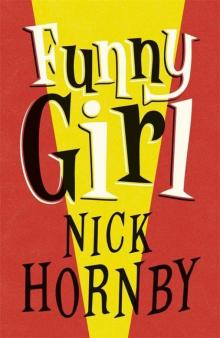 Funny Girl
Funny Girl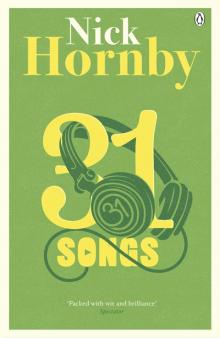 31 Songs
31 Songs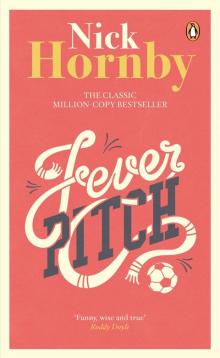 Fever Pitch
Fever Pitch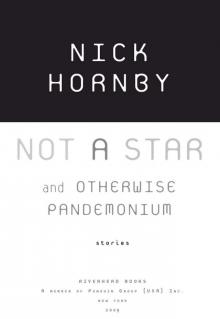 Not a Star and Otherwise Pandemonium
Not a Star and Otherwise Pandemonium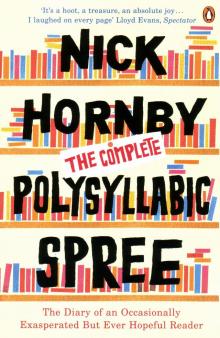 The Complete Polysyllabic Spree
The Complete Polysyllabic Spree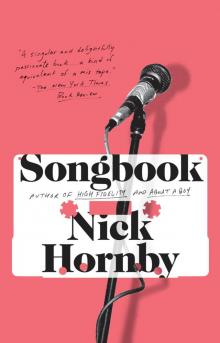 Songbook
Songbook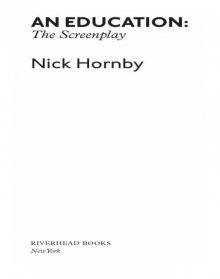 An Education
An Education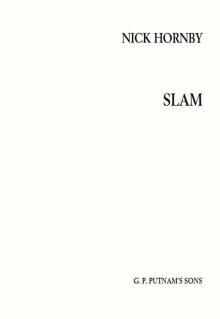 Slam
Slam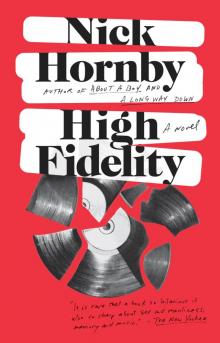 High Fidelity
High Fidelity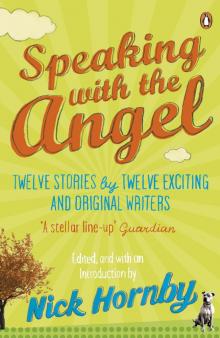 Speaking With the Angel
Speaking With the Angel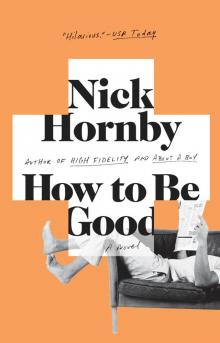 How to Be Good
How to Be Good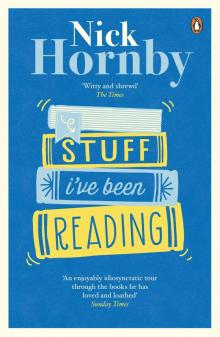 Stuff I've Been Reading
Stuff I've Been Reading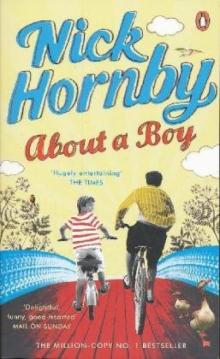 About a Boy
About a Boy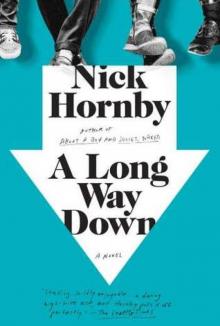 A Long Way Down
A Long Way Down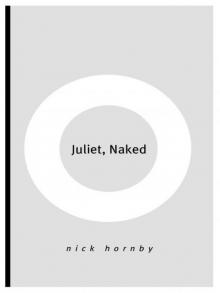 Juliet, Naked
Juliet, Naked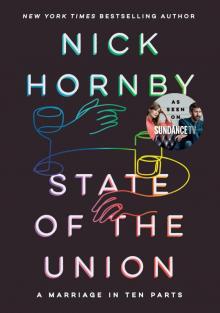 State of the Union
State of the Union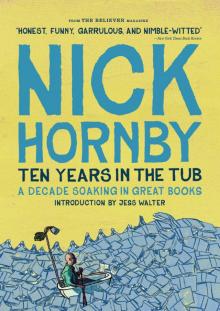 Ten Years in the Tub: A Decade Soaking in Great Books
Ten Years in the Tub: A Decade Soaking in Great Books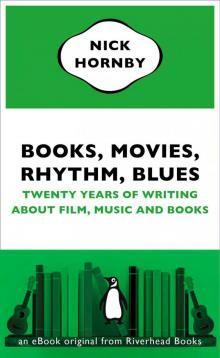 Books, Movies, Rhythm, Blues: Twenty Years of Writing About Film, Music and Books
Books, Movies, Rhythm, Blues: Twenty Years of Writing About Film, Music and Books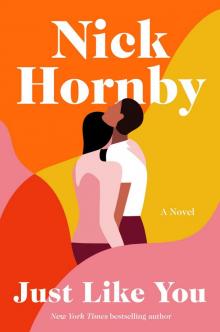 Just Like You
Just Like You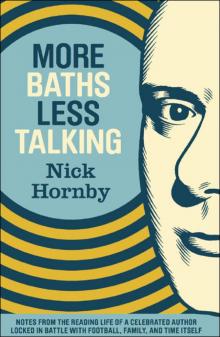 More Baths Less Talking
More Baths Less Talking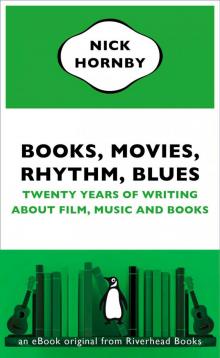 Books, Movies, Rhythm, Blues
Books, Movies, Rhythm, Blues